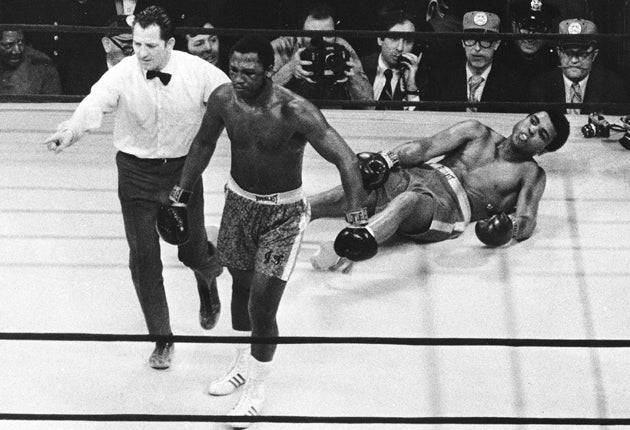Arthur Mercante: Boxing referee who took charge of the first fight between Muhammad Ali and Joe Frazier

Your support helps us to tell the story
From reproductive rights to climate change to Big Tech, The Independent is on the ground when the story is developing. Whether it's investigating the financials of Elon Musk's pro-Trump PAC or producing our latest documentary, 'The A Word', which shines a light on the American women fighting for reproductive rights, we know how important it is to parse out the facts from the messaging.
At such a critical moment in US history, we need reporters on the ground. Your donation allows us to keep sending journalists to speak to both sides of the story.
The Independent is trusted by Americans across the entire political spectrum. And unlike many other quality news outlets, we choose not to lock Americans out of our reporting and analysis with paywalls. We believe quality journalism should be available to everyone, paid for by those who can afford it.
Your support makes all the difference.The first battle between Muhammad Ali and Joe Frazier, at New York's Madison Square Garden, 8 March 1971, was perhaps the the most deserving of all boxing matches billed as "the fight of the century". When it came time to choose the referee there was little doubt it would be Arthur Mercante. Mercante was the third man in the ring for some 145 title fights, known for stamping his authority on a bout; when he gave orders even the toughest fighters paid attention. But on the biggest stage of his career he made perhaps his biggest mistake, accidentally poking Frazier in the eye while breaking a 10th-round clinch. Although Frazier's seconds were enraged, their fighter went on to take the fight by unanimous decision. Mercante, however, was not in the ring for either of their rematches.
Mercante was born in Brockton, Massachusetts, childhood friends with the future heavyweight champion Rocky Marciano. He idolised his maternal uncle, Joe Monte, a heavyweight good enough to have fought Max Schmeling and score a win and a draw in three fights with Jim Braddock. After the family moved to Brooklyn, Mercante entered New York's Golden Gloves at 16, but his father insisted he go to college rather than turn professional. He boxed at New York University, but was also a metropolitan champion diver.
After graduating in 1942 he joined the Navy, where he taught boxing in a fitness programme commanded by another ex-champ, Gene Tunney. After the war he earned a masters degree in physical education at NYU, then settled on Long Island, coaching boxing at the US Merchant Marine Academy in Kings Point, and refereeing college bouts. After turning pro in 1954 he worked for New York's Rheingold and Schaefer breweries, and later as deputy parks and recreation commissioner for the town of Hempstead.
When Mercante finally got a title bout it was a big one, the 1960 contest at New York's Polo Grounds when Floyd Patterson became the first heavyweight to regain the belt, knocking out Ingemar Johansson with a vicious left hook in the fifth round. As Johansson lay twitching on the mat, Mercante worried that his first championship might end in tragedy. "I was definitely afraid, very concerned," he recalled in 1995. "It could have been the end. It wasn't that I let the fight go too long. It was just one punch. Now, if I see a fighter winning every round, I stop it."
Indeed, he famously stopped Frazier's 1971 title bout in Kingston, Jamaica in round two, after George Foreman had knocked the champion down six times. "Frazier was a bull, a tough, tough guy. You'd have to hit him with a sledgehammer to knock him out... he was up and ready to go when I stopped the fight."
Mercante's own favourite fighter was Sugar Ray Robinson. He claimed "chills ran up and down my spine" when he officiated Robinson's 1962 bout at the Garden against Danny Moyer. That year he also served as technical advisor for the movie version of Rod Serling's teleplay Requiem For A Heavyweight. Mercante recommended Ali, a fast-rising heavyweight then still called Cassius Clay, for a role as an opponent for Anthony Quinn, and played the fight's referee. A fixture in the New York boxing scene, he refereed the Ali-Ken Norton fight in 1976 that was Yankee Stadium's last boxing match.
Mercante was elected to the International Boxing Hall of Fame in 1995, the first active referee to be so honoured. In 1984, one of his sons, Arthur, Jr., followed him into the trade, and in 1999 Arthur, Snr lost out on officiating the Lennox Lewis-Evander Holyfield fight to his son. Mercante jumped rope and exercised daily, fit enough to referee until he was 81, his last fight a junior flyweight title bout between Ricardo Lopez and Zolani Petelo on the Bernard Hopkins-Felix Trinidad undercard, appropriately at Madison Square Garden, just after 9/11 in 2001. That year he also experienced what he called his "most heart-wrenching experience" in boxing when light-heavyweight Beethavean Scottland died after a match refereed by Arthur Jr.
He continued for a number of years as a fight judge, and in 2006 published a memoir, Inside The Ropes, co-written with Phil Guarnieri, the mayor of another Long Island town, Floral Park. His formula for success was simple: "You need to be firm but never intrusive; alert, but not overreactive; mobile, but never out of position to intervene at a moment's notice." He is survived by his wife Gloria, and three sons.
Michael Carlson
Arthur Mercante, boxing referee: born Brockton, Massachusetts 27 January 1920; married (three sons); died Westbury, New York 10 April 2010.
Join our commenting forum
Join thought-provoking conversations, follow other Independent readers and see their replies
Comments